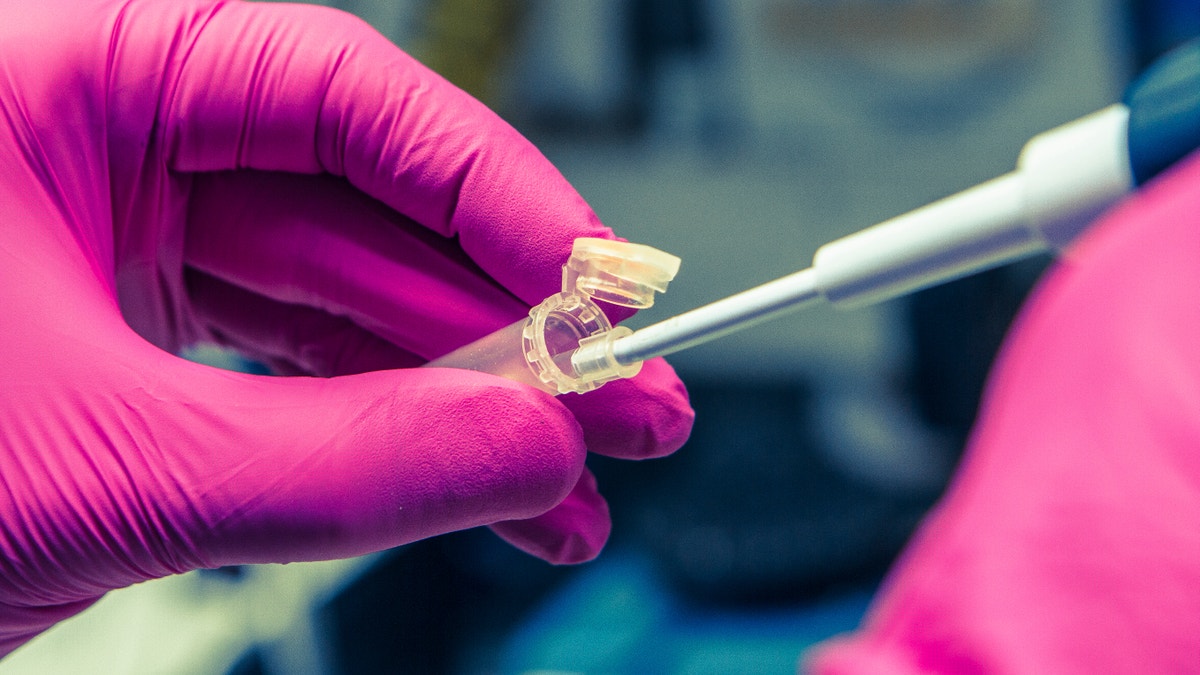
Pipette fills centrifuge tube for a scientific experiment (iStock)
It’s a dilemma more and more cancer patients will face as genetic testing becomes part of everyday health care: When a DNA test indicates low risk of a tumor spreading, but traditional tests show a high risk, which do you believe?
According to a large European study of 6,693 patients published on Wednesday, many women with early breast cancer can safely believe the genetic test.
Patients who skipped chemotherapy when a genetic test showed low risk of the cancer advancing but a traditional test suggested high risk were almost as likely to survive five years without the cancer recurring as those who had chemo. (The traditional tests look for cancer cells in lymph nodes and fast-dividing cells, for instance, and include demographic facts of life, such as being over 50.)
The test’s manufacturer, Amsterdam-based Agendia, and sponsors of the study described it as “landmark” research that “could change clinical practice.”
If widely adopted, the results could spare 35,000 women with early-stage breast cancer in the US each year the ordeal, toxicity, and expense of chemotherapy, hormone-based therapy such as tamoxifen, or other drugs after they undergo the first-line treatments of surgery and, usually, radiation.
But some oncologists not involved in the study were more cautious.
“I don’t think they accomplished what they meant to,” said Dr. Harold Burstein, a breast cancer physician at Dana-Farber Cancer Institute. He noted that there was, indeed, “a small advantage from chemotherapy” even when the genetic test suggested low risk and therefore no need for chemo.
Women who had chemo despite genetic results saying they were at low risk had a 1.9 percentage point greater chance of surviving to five years without the cancer showing up in their bones, brain, liver, or other metastatic site. They also had a 1.5 percentage point greater chance of being alive, compared to women who put their faith in the genetic test.
“A difference of 1.5 percentage points, if real, might mean more to one patient than to another,” oncologists Dr. Clifford Hudis and Dr. Maura Dickler of Memorial Sloan Kettering Cancer Center wrote in an editorial accompanying the study in the New England Journal of Medicine. A benefit of “only” 1.5 percentage points is something “that clinicians and patients might find meaningful.”
Another concern is how long the patients in the study, who had stage 1 or 2 breast cancer, were followed: five years. The study therefore can’t say whether skipping chemo based on a genetic test makes it more likely that early breast cancer will spread six, 10, 15, or more years later. (The researchers are continuing to study the women in order to answer that.)
The main results of the study, called MINDACT, were presented in April at the annual meeting of the American Association for Cancer Research. The NEJM paper goes into more detail.
In actual numbers, 94.8 percent of women with genetic results indicating a low risk of advanced disease but “clinical” results indicating a high risk made it to five years without their cancer advancing if they skipped chemo. Among patients with similar test results who opted for drug treatments, 96.7 percent did. Looked at another way, 5.2 percent of the no-chemo group saw their cancer advance within five years, while 3.3 percent of women who had chemo did.
The study, led by Dr. Martine Piccart of the Jules Bordet Institute in Brussels and conducted in nine European countries, is the latest to assess how well genetics can guide cancer treatment, not only to identify a treatment but also to say when treatment (especially chemo) can safely be skipped.
A 2015 study, also in breast cancer, reported that a test of 21 genes, called Oncotype DX, could identify which patients have a 99 percent chance of surviving without metastatic tumors appearing in the next five years even though they did not have chemotherapy.
The genetic test used in MINDACT, called MammaPrint, analyzes 70 genes associated with a breast tumor’s chance of metastasizing. It was approved for early breast cancer by the Food and Drug Administration in 2007 and has a list price of $4,200, which Medicare and some private insurance plans cover.
The study was funded by the nonprofit European Organisation for Research and Treatment of Cancer; six of the 34 authors have financial or other ties to Agendia. Study coauthor Laura van’t Veer of the University of California, San Francisco, is the company’s cofounder, its chief research officer, and inventor of MammaPrint.
She defended the study’s focus on five-year results because if breast cancer is going to metastasize it is most likely to do so in the first two to five years after a woman’s initial treatment. As to whether the 1.5-percentage-point lower chance of avoiding metastasis is enough to make women ignore the encouraging genetic results and choose drug therapy, “the small benefit [of that therapy] is something to discuss between a woman and her physician,” said van’t Veer. “Everyone has to reach their own judgment.”








































